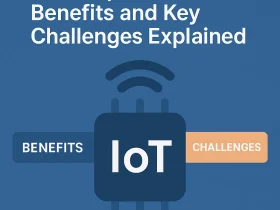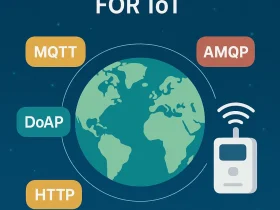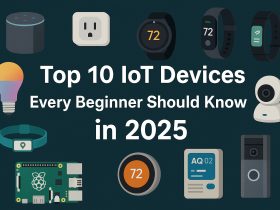Best IoT Development Boards for Students in 2025 | Full Guide
Introduction
In the rapidly evolving world of the Internet of Things (IoT), choosing the right development board is crucial—especially for students, hobbyists, and beginners. The right IoT board can unlock your creativity, help you build real-world applications, and even launch your tech career.
With hundreds of options on the market, it can be overwhelming. That’s why we’ve curated a student-friendly guide to the top 20 IoT development boards of 2025—based on affordability, ease of use, community support, Wi-Fi/Bluetooth capabilities, and compatibility with sensors and cloud services.
Whether you’re working on a college project, building a smart home system, or exploring AI in IoT, this article will help you pick the best board that matches your goals.
What to Consider When Choosing an IoT Board as a Student
Before diving into the list, here are some important criteria for students:
| Criteria | Why it Matters |
|---|---|
| Ease of Use | Ideal for beginners with less coding/electronics experience. |
| Connectivity | Boards with built-in Wi-Fi/Bluetooth save time and effort. |
| Community Support | A large community means more tutorials and help. |
| Cost & Availability | Budget-friendly boards are preferred for learning. |
| Expandable | Support for sensors, cloud services, and AI is a plus. |

Top 20 IoT Development Boards for Students in 2025
1. ESP32 DevKit V1
One of the most powerful and affordable IoT boards, the ESP32 offers Wi-Fi and Bluetooth out of the box. It’s perfect for beginners and advanced users building smart home or wearable projects.
- Key Features: Dual-core, 240 MHz, Wi-Fi, BLE, low-power
- Best For: Smart homes, wearable tech, IoT dashboards
- Price: ₹300–₹400 INR / $4–$6 USD
2. Raspberry Pi 4 Model B
A mini-computer with serious power. Great for students working on image processing, AI, or full-fledged applications.
- Key Features: Quad-core ARM, up to 8GB RAM, USB 3.0, HDMI
- Best For: Edge AI, smart surveillance, full Linux apps
- Price: ₹3500–₹6500 INR / $45–$75 USD
See more: Raspberry Pi 4 Computer Model B- Latest with 4 GB RAM
3. Arduino Uno R4
A classic for electronics and IoT learning. In 2025, the R4 version features improved power management and faster processing.
- Key Features: ATmega32U4, great for analog and digital sensors
- Best For: Learning basics, sensor control, LED displays
- Price: ₹600–₹800 INR / $10–$12 USD
See more: What is Arduino UNO Board? -Board for Rapid Prototyping
4. NodeMCU ESP8266
A smaller sibling of ESP32, NodeMCU is ideal for students doing budget Wi-Fi-based IoT projects.
- Key Features: Wi-Fi, low-power, USB programming
- Best For: Cloud-connected devices, MQTT, Firebase
- Price: ₹250–₹350 INR / $3–$5 USD
See more: NodeMCU ESP8266; WiFi Board for Arduino and IoT
5. Raspberry Pi Pico W
Raspberry Pi’s answer to microcontroller IoT boards. The ‘W’ version includes Wi-Fi.
- Key Features: RP2040 dual-core, Wi-Fi, low power
- Best For: Sensor data, remote logging, low-cost IoT
- Price: ₹400 INR / $5 USD
See more: Getting started with Raspberry Pi Pico with MicroPython
6. Arduino Nano 33 IoT
A compact board that brings Wi-Fi, BLE, and sensor compatibility in a tiny form factor.
- Key Features: SAMD21 Cortex M0+, Wi-Fi, BLE
- Best For: Wearables, mobile devices, remote sensors
- Price: ₹1500 INR / $18–$20 USD
See more: What is Arduino Nano Board? Features, datasheet and Pinout
7. Seeed Studio XIAO ESP32C3
This ultra-small board is great for edge devices and AI use cases on the go.
- Key Features: ESP32-C3 RISC-V core, Wi-Fi, BLE
- Best For: TinyML, IoT sensors, wearables
- Price: ₹800 INR / $9–$11 USD
8. BeagleBone Black
A more powerful alternative to Raspberry Pi, ideal for industrial-grade or robotics projects.
- Key Features: AM335x 1GHz ARM Cortex-A8, PRU
- Best For: Real-time processing, robotics, AI-on-edge
- Price: ₹4800–₹6000 INR / $60–$70 USD
See more: BeagleBone Black: Overview, Features, Specs; Use cases in 2025
9. Adafruit Feather HUZZAH ESP32
Adafruit’s beginner-friendly IoT board with battery support and USB-C.
- Key Features: ESP32-based, LiPo charging, STEMMA QT
- Best For: Wearables, Wi-Fi/BT projects with sensors
- Price: ₹1900 INR / $22–$25 USD
10. SparkFun Thing Plus (ESP32-WROOM)
Perfect for rapid prototyping and cloud-based applications.
- Key Features: ESP32-WROOM, Qwiic connector, USB-C
- Best For: Firebase, Google Cloud IoT
- Price: ₹1800 INR / $22 USD

11. STM32 Nucleo Boards
For students aiming to work in embedded systems or industrial IoT.
- Key Features: ARM Cortex-M processors, STM32Cube support
- Best For: Learning embedded C, industry projects
- Price: ₹900–₹1800 INR / $12–$20 USD
12. Wio Terminal (Seeed Studio)
An all-in-one board with display, sensors, and Wi-Fi/BLE—ideal for data dashboards.
- Key Features: ATSAMD51, LCD, Wi-Fi, BLE, Grove sensors
- Best For: Dashboard projects, STEM learning
- Price: ₹3400 INR / $38–$42 USD
13. BBC micro:bit V2
A popular board in educational institutes for early learners.
- Key Features: 25 LEDs, BLE, accelerometer, compass
- Best For: School projects, basic IoT coding
- Price: ₹1600–₹2000 INR / $18–$25 USD
14. Heltec WiFi Kit 32
Great for IoT + OLED display-based projects.
- Key Features: ESP32, onboard OLED, LoRa version available
- Best For: LoRa + Wi-Fi experiments, dashboards
- Price: ₹800 INR / $9–$11 USD
15. Banana Pi BPI-M2 Zero
A Raspberry Pi Zero alternative with better performance.
- Key Features: Quad-core ARM, Wi-Fi, GPIO
- Best For: IoT edge computing, light Linux tasks
- Price: ₹2000 INR / $24 USD
16. Onion Omega2+
Specifically designed for IoT—comes with Linux OS onboard.
- Key Features: Wi-Fi, 128MB RAM, 32MB storage
- Best For: Smart homes, Linux-based IoT devices
- Price: ₹1500–₹1800 INR / $19–$22 USD
17. LattePanda 3 Delta
A Windows + Arduino dual-boot board for hybrid IoT applications.
- Key Features: Intel CPU, Arduino Leonardo onboard
- Best For: Industrial IoT, AI+Windows Edge
- Price: ₹20,000+ INR / $250 USD
18. Orange Pi Zero 2
Another Raspberry Pi alternative that’s gaining attention in 2025.
- Key Features: Quad-core, 512MB/1GB RAM, Wi-Fi
- Best For: Budget Linux IoT tasks
- Price: ₹2200 INR / $26 USD
19. Google Coral Dev Board
For AI + IoT integration with Edge TPU.
- Key Features: Edge TPU, camera, Linux, Wi-Fi
- Best For: Smart camera, object detection IoT
- Price: ₹9000–₹11000 INR / $120–$130 USD
20. ESP32-S3 DevKitM
Newest ESP32 version with better AI instructions and camera interface.
- Key Features: AI acceleration, Wi-Fi, BLE 5.0
- Best For: AI-enabled IoT, camera recognition
- Price: ₹500–₹600 INR / $7–$9 USD
Comparison Table: IoT Development Boards for Students (2025)
| Board Name | Wi-Fi | BLE | OS Support | Cost (INR) | Best For |
|---|---|---|---|---|---|
| ESP32 DevKit | ✅ | ✅ | Arduino/IDF | ₹300 | General IoT |
| Raspberry Pi 4 | ✅ | ✅ | Linux | ₹3500+ | AI/Multimedia |
| Arduino Uno R4 | ❌ | ❌ | Arduino | ₹700 | Learning basics |
| NodeMCU ESP8266 | ✅ | ❌ | Arduino | ₹300 | Budget IoT projects |
| Pico W | ✅ | ❌ | MicroPython | ₹400 | Sensor & cloud experiments |
| Arduino Nano 33 IoT | ✅ | ✅ | Arduino | ₹1500 | Wearables |
| XIAO ESP32-C3 | ✅ | ✅ | Arduino | ₹800 | TinyML |
| BeagleBone Black | ✅ | ❌ | Linux | ₹5000 | Industrial IoT |
| Feather ESP32 | ✅ | ✅ | Arduino | ₹1900 | Wearables, quick prototyping |
| SparkFun Thing Plus | ✅ | ✅ | Arduino | ₹1800 | Firebase/Cloud projects |
Conclusion: Which IoT Board is Best for Students in 2025?
- If you’re just getting started: Arduino Uno or NodeMCU
- If you want advanced features: ESP32 DevKit or Raspberry Pi Pico W
- If you’re working with AI or Edge computing: Raspberry Pi 4, ESP32-S3, or Google Coral Dev Board
- If you’re into compact projects or wearables: XIAO ESP32-C3 or Arduino Nano 33 IoT
Tip for students: Start with ESP32 or Raspberry Pi Pico W. Both are affordable, powerful, and have massive online communities.
See also: How to Use IoT Device Over Internet: A Beginner’s Guide
Ready to start building? Explore our hands-on IoT projects for students using ESP32, Raspberry Pi, and Arduino on IoT Projects for Students.
Frequently Asked Questions (FAQ)
Which is the best IoT board for students in 2025?
ESP32 DevKit and Raspberry Pi Pico W are excellent choices for students due to their low cost, built-in Wi-Fi, and large online community support. These boards are ideal for beginners and can power a wide range of IoT applications.
What is the difference between ESP32 and Raspberry Pi?
ESP32 is a microcontroller, suitable for low-power, real-time tasks and sensor-based applications. Raspberry Pi, on the other hand, is a full-fledged single-board computer capable of running Linux, making it suitable for multimedia, AI, and complex IoT solutions.
Which board should I use for AI and Machine Learning-based IoT projects?
If your project involves AI or edge computing, go for Raspberry Pi 4, ESP32-S3, or Google Coral Dev Board. These support powerful libraries and hardware accelerators for machine learning tasks.
Are there any affordable IoT boards with Wi-Fi?
Yes! Boards like NodeMCU ESP8266, ESP32 DevKit, and Raspberry Pi Pico W come with built-in Wi-Fi and are available for less than ₹500, making them perfect for student projects.
Can I use Arduino boards for IoT?
Absolutely. Boards like Arduino Uno R4, Nano 33 IoT, and Arduino MKR WiFi 1010 are designed for IoT prototyping and support Wi-Fi/BLE connectivity and cloud integration. They are widely used for learning and rapid development.
Ready to Explore More? Let’s Build Smarter Together!
Subscribe to Our YouTube Channel » for IoT video Tutorials.
Start Learning IoT Basics Now » and What is IoT? – Introduction to IoT for Beginners on IoTDunia.com!
and Check out Top IoT Applications in Real World – Smart Use Cases 2025, IoT career guide 2025, Best Projects on IoT for Beginners
Have questions? Drop them in the comments!
Start small, stay curious, and make your world smarter—one device at a time.










Leave a Review